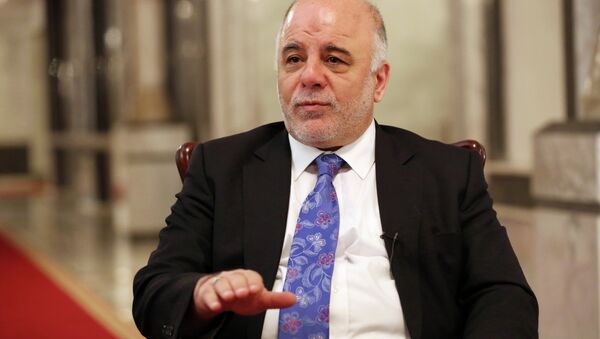MOSCOW, November 30 (Sputnik) — Iraqi Prime Minister Haidar al-Abadi’s office announced on Sunday that an investigation had revealed the existence of 50,000 ‘ghost soldiers’, Agence France-Presse reports.
“The prime minister revealed the existence of 50,000 fictitious names” in the country’s military, a statement from Abadi’s office noted after a regular session of the country’s parliament. The statement noted that the prime minister had already scrapped the phantom jobs, equivalent to nearly four army divisions. “Over the past few weeks, the PM has been cracking down to expose the ghost soldiers and get to the root of the problem,” Abadi’s spokesman Rafid Jaboori was quoted by AFP as saying.
‘Ghost soldiers’, literally translated from Arabic as ‘space men’, are soldiers listed on the payroll of Iraq’s security forces, but do not actually exist. Officers and even the commanders of entire brigades have been suspected of listing more men under their command than really exist. They do so by firing soldiers and not taking them off the payroll, splitting salaries, pocketing half and giving the rest to men who do not show up to work, and even listing soldiers who have defected or been killed.
Mohammed Othman al-Khalidi, former lawmaker and leader of the Mutahidoun political bloc in Iraq’s parliament, told al-Monitor that these “ghost employees were one of the reasons behind the shocking collapse of the Iraqi army before the Islamic State in Mosul” this past June. Khalidi estimated that up to 30 percent of Iraq’s army were actually ‘ghosts’, noting that this problem exists at all levels of government, not just in the military. Explaining the deep roots of the problem of ghost personnel, Qasim Mozan noted that it existed in Iraq to some extent even before 2003, while Saddam Hussein was still in power.
The issue has hit the Iraqi army particularly hard following the withdrawal of US forces in 2011. The estimated 400,000-strong security forces apparatus built up with US assistance has been estimated to have shrunk down to as few as 85,000 active troops following the disintegration of several divisions after the Islamic State militant group captured Mosul, the Washington Post explained last week.
Prime Minister Abadi, who took office in September of this year following the departure of Nouri al-Maliki, had promised a broad crackdown on corruption in the Iraqi government. He has recently sacked and retired several top military commanders, and Jaboori noted that the prime minister’s “weeding out process will extend beyond the military to all state institutions.”
The prime minister’s decision follows comments by Finance Minister Hoshiyar Zebari earlier this week, who told Reuters on Thursday that next year’s budgetary allocations to the military will need “some serious deep-rooted reforms” in order “to fight corruption [and] mismanagement,” including the phenomenon of the ‘ghost soldiers’. Zebari called for greater checks and balances, accountability, accounting for men and materials, “for weapons or salaries, for munitions or food. These are basic things [and] it doesn’t take a genius [to understand],” the minister said.
Political analyst Jasim al-Mousway told Al-Monitor that he feels confident that “a campaign is underway to solve” the problems of corruption, and that “the upcoming years will witness a decrease in corruption particularly within the military institution.”


